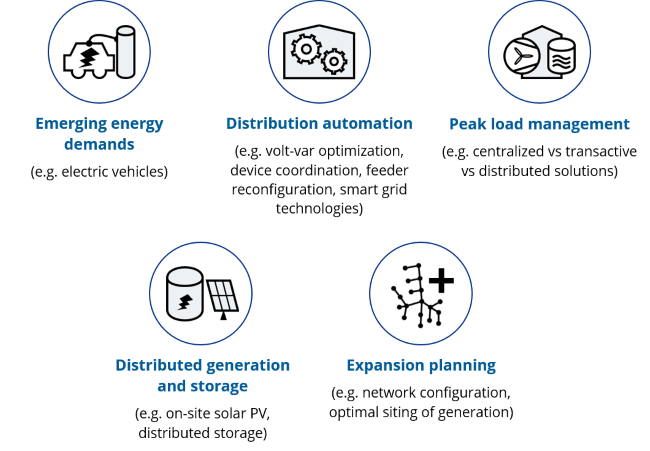
Important
Work in progress: The repository is under active development and interfaces may change without notice. Please use GitHub issues for raising problems, questions, comments and feedback.
What is MESMO?#
MESMO stand for “Multi-Energy System Modeling and Optimization” and is an open-source Python tool for the modeling, simulation and optimization of multi-scale electric and thermal distribution systems along with distributed energy resources (DERs), such as flexible building loads, electric vehicle (EV) chargers, distributed generators (DGs) and energy storage systems (ESS).
Features#
MESMO implements 1) non-linear models for simulation-based analysis and 2) convex models for optimization-based analysis of electric grids, thermal grids and DERs. Through high-level interfaces, MESMO enables modeling operation problems for both traditional scenario-based simulation as well as optimization-based decision support. An emphasis of MESMO is on the modeling of multi-energy systems, i.e. the coupling of multi-commodity and multi-scale energy systems.
Electric grid modeling
Simulation: Non-linear modeling of steady-state nodal voltage / branch flows / losses, for multi-phase / unbalanced AC networks.
Optimization: Linear approximate modeling via global or local approximation, for multi-phase / unbalanced AC networks.
Thermal grid modeling
Simulation: Non-linear modeling of steady-state nodal pressure head / branch flow / pump losses, for radial district heating / cooling systems.
Optimization: Linear approximate modeling via global or local approximation, for radial district heating / cooling systems.
Distributed energy resource (DER) modeling
Simulation & optimization: Time series models for non-dispatchable / fixed DERs.
Optimization: Linear state-space models for dispatchable / flexible DERs.
Currently implemented DER models: Conventional fixed loads, generic flexible loads, flexible thermal building loads, non-dispatchable generators, controllable electric / thermal generators, electric / thermal energy storage systems, combined heat-and-power plants.
Solution interfaces
Simulation: Solution of non-linear power flow problems for electric / thermal grids.
Optimization: Solution of convex optimization problems for electric / thermal grids and DERs, through third-party numerical optimization solvers.
Generic optimization problem interface: Supports defining custom constraints and objective terms to augment the built-in models. Enables retrieving duals / DLMPs for the study of decentralized / distributed control architectures for energy systems.
High-level problem interfaces: Nominal operation problem for simulation-based studies; Optimal operation problem for optimization-based studies.
Use cases#
District-scale energy systems are evolving from unidirectional, top-down structures into bidirectional, distributed and multi-commodity systems. Furthermore, the increased coupling of electric, thermal and other energy systems in terms of multi-energy systems enables additional flexibility across conventional system boundaries. MESMO is intended to support the various studies that are motivated by these recent developments for district-scale energy systems, such as the examples highlighted below:

Emerging energy demands: What is the impact of EV charging deployment on distribution system operation?
Distribution automation: How can the distribution system operator address imminent operational issues?
Peak load management: Are transactive energy mechanisms suited to increase participation of DERs in maintaining distribution system reliability?
Distributed generation and storage: Can energy storage systems help mitigate adverse impacts of large-scale solar PV deployment?
Expansion planning: What are optimal investment decisions for distribution system upgrades?
Acknowledgements#
MESMO is developed in collaboration between TUMCREATE, the Institute for High Performance Computing, A*STAR and the Chair of Renewable and Sustainable Energy Systems, TUM.
Sebastian Troitzsch implemented the initial version of MESMO and maintains this repository.
Sarmad Hanif and Kai Zhang developed the underlying electric grid modeling, fixed-point power flow solution and electric grid approximation methodologies.
Arif Ahmed implemented the implicit Z-bus power flow solution method & overhead line type definitions.
Mischa Grussmann developed the thermal grid modeling and approximation methodologies.
Verena Kleinschmidt implemented several multi-energy DER models, such as the heating plant and CHP plant models.
Sebastian Troitzsch and Tom Schelo implemented the optimization problem class.
This work was financially supported by the Singapore National Research Foundation under its Campus for Research Excellence And Technological Enterprise (CREATE) programme.


